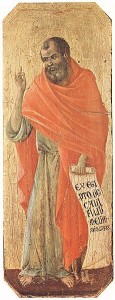Hosea 11:1-11
This text is used for the Lectionary Year C on July 31, 2016.

For most of Hosea chapters 1-10, Israel has heard of her apostasy and rebellion against the Lord. These charges include judgment and pending punishment. Hosea 11 departs from this cycle, offering a statement of God’s love for the people and a promise of future restoration.
For those concerned with the patriarchal language from Hosea 1 last week, the imagery moves from one of marriage between man (God) and woman (Israel)—made incarnate through Hosea and Gomer—to the metaphor of a parent (God) and child (Israel). The language surrounding this picture, particularly in the first section of verses 1-4, invites consideration of God as a mother who nurtures and cares for the young. Within the male dominated society of ancient Israel, women had the tasks of child-rearing. In this way, God mothers Israel out of infancy to maturation. As any parent of adult children knows, once the kids are able to make their own decisions, they don’t always make the right, or righteous, ones.
Lest we forget, Hosea is the father of Jezreel, Lo-Ruhammah and Lo-Ammi. The reader may hear his own vexation as a parent of rebellious children in these opening verses. These I-statements reveal a parent in pain and anguish, receiving apathy and hostility for the offering of love and care. God nurtured Israel only to have Israel lay its affection upon idols and false gods. The prophetic words do not arise from anger but from longing and disregarded love.
Verses 5-7 put the rebellion within historical context. As Egypt once held the chains of enslaved Israel, in the near future Israel will have to answer to Assyria. As the people cried to God prior to the exodus, so too they will beseech God for rescue from Nineveh. The salvation history of Israel cycles through once more.
The tone dramatically shifts in verse 8. The references to Admah and Zeboiim refer to Deuteronomy 29:23. God destroyed these towns, much like Sodom and Gomorrah, in anger over their disobedience. While the situation is much the same with Israel’s rebellion, God chooses not to obliterate Israel. This is mercy. Israel has earned God’s anger but does not receive those just desserts.
Hosea’s contemporaries would have heard references to Assyria in the lion image of verse 10. Again, the past and future of Israel provide some repetition. The passage concludes with the promise of restoration. Despite rebellion and cowardice when facing Assyrian power, God will return Israel to the promised land. This is undeserved grace.
For the preacher there are several points from which to launch a message. First, the use of masculine roles in Hosea 1 are offset by the feminine imagery in this chapter. This is not to argue that God is father or mother, spouse or parent. The imagery utilized in Hosea 1 was not to cast God as male; neither is the imagery used here determined to represent God as a female. Rather, the use of both of these images enables us to see the width and breadth of God’s concern and care for us. In Hosea, we witness a love that exceeds and transcends gender roles; we can encounter the best of what love is from a parent and from a spouse through our experience of God’s love. But God’s love exceeds the care of the best parent and best spouse.
While there is both a quantitative and qualitative difference in God’s love for us and a parent’s love for one’s children, most parents will sympathize with the heartache expressed in verse 1-4. These words do not come from anger or indignation; they come from a pit of sadness over loving a child enough to mourn that child’s poor decisions. We sympathize with God’s predicament. The danger inherent to this line of thought however is that each listener is that rebellious child, even those who are also parents among us. The preacher may appeal to the love of parents for their children as a way for us to connect with God’s passion. If the sermon moves swiftly to a recognition that we are all rebellious children, chasing after idols and breaking God’s heart, then the reflection of parents loving rebellious children may allow for a deeper understanding of God’s grief over our sinfulness and wayward behavior. If on the other hand the preacher lingers too long on this point, then hearers may only view others as rebellious offenders without including themselves.
The passage portrays God’s desire to correct us from a dangerous and wayward path, much like a parent. God seeks our obedience for divine glory; but God also desires our protection and benefit. God is not some angry taskmaster seeking to bestow retribution upon the imperfect. God offers restorative justice to Israel. How might our understanding of God change if we took seriously the parental nature of God’s love? How might our responses to discipleship change if we viewed God as a loving benefactor rather than an entity to please?
Finally, Hosea 11 reminds us of the repetitive cycle of Israel’s rebellion. The sin of the Abraham cycles in Genesis led to Egyptian enslavement. God rescued the people from Pharoah and lead them to the promised land. We view a repeat of this with Israel’s idolatry and the Assyrian threat. And yet, God loves the people enough to promise deliverance, again. As followers of Jesus continue on a path of discipleship, we sin, repent, sin and repent. God’s love for us remains constant, even when our devotion to God does not. Mercy and grace abound.
 James H. Coston
James H. Coston
Senior Pastor
Calvary Baptist Church, Waco, Texas
james_coston@baylor.edu
Tags: God as parent; maternal images; cycles of grace and mercy
